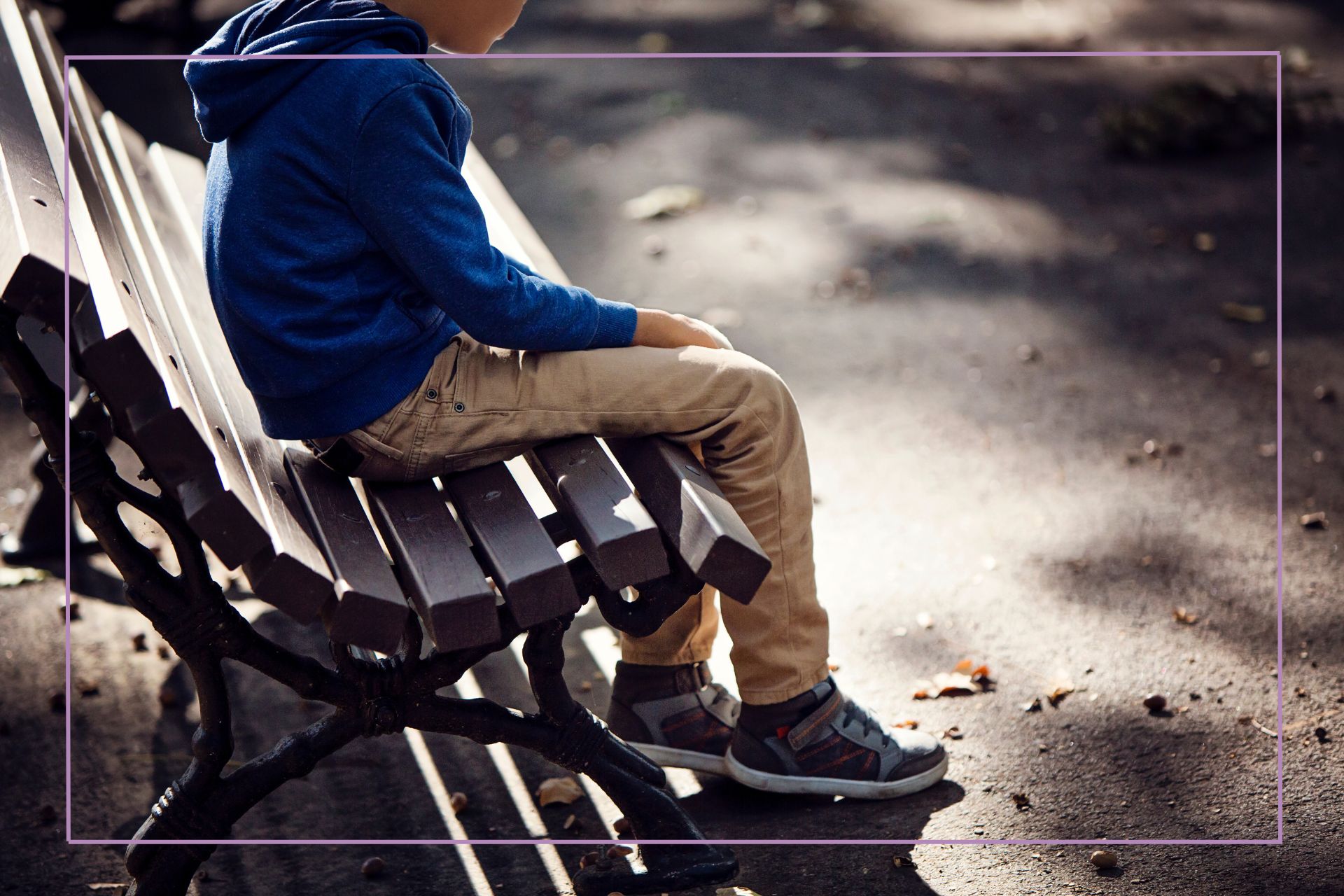Neglectful parenting: what is it and how does it look? We ask two psychotherapists for all the information (plus what the lasting effects might be)
Neglectful parenting isn't necessarily a parenting style choice

Parenting advice, hot topics, best buys and family finance tips delivered straight to your inbox.
You are now subscribed
Your newsletter sign-up was successful
Neglectful parenting, sometimes known as uninvolved parenting, is where parents make few to no demands of their kids and show a distinct lack of responsiveness to their needs - physically, emotionally, and mentally.
There are many positive parenting styles out there that are actively adopted by parents - like gentle parenting - with many mums and dads making concerted efforts to change their responses to certain behaviour to fit that style. There are also parenting styles that are a natural fit depending on the parent's own childhood, such as authoritative, helicopter parenting, and tiger parenting.
Editor's note
We do not advocate neglectful parenting to be a parenting style to choose. Neglectful parenting can be a serious cause for concern in some cases. If you are ever at all concerned about a child's welfare be sure to make contact with NSPCC
The term neglectful parenting has a lot of weight attached to it as the scale of neglect can range massively. When we hear the word neglect we often think of social services, the intervention of some kind, and 'saving' the child. Neglectful as a 'parenting style' is often not intentional, as Dr Amanda Gummer tells us; "Neglectful parenting happens when parents unintentionally fail to meet their child’s basic needs. Things such as engaging with them invaluable playtime, showing love, or giving them attention."
In this article, we ask the experts Anna Mathur and Dr Amanda Gummer, and look at what neglectful parenting is, what it's not, and whether there are any benefits to this parenting style.
What is neglectful parenting?
Neglectful parenting involves a lot less 'hand-holding' compared to other parenting styles and can sometimes come across as cold. It's characterised by a lack of emotional, physical, or educational support, often resulting in long-term consequences for the child's well-being. Examples of neglectful parenting include consistently ignoring a child's needs, failing to provide proper supervision, and being indifferent to their emotional struggles. Recent studies from the American Academy of Pediatrics, emphasize the detrimental effects of neglectful parenting.
Children parented like this tend to receive little guidance, discipline, or nurturing from the main grown ups in their life. And often kids are left to raise themselves and make decisions — big and small — on their own. It's because of this, that it's easy to pass judgment on these parents. But whether you’re an uninvolved parent or you know someone who is, it’s important to remember that this parenting style isn’t always intentional. The reasons why some parents end up raising their kids this way varies.
We know that many parents might identify with feeling overworked, stressed, and tired in general. And, when it all gets too much they might brush off their child for a few minutes peace. That isn't this. You are not a neglectful parent if you know you have done that - we all have. And, as guilty as you might feel afterwards, these moments aren’t characteristics of neglectful parenting. Neglectful parenting is a consistent and ongoing pattern of emotional distance between parent and child.
Parenting advice, hot topics, best buys and family finance tips delivered straight to your inbox.
This parenting style and the word 'neglectful' is problematic, family psychotherapist, Anna Mathur tells us. "A neglected child tends to be where basic needs aren't being met, and being overlooked. The throwaway use of the word doesn't sit well with me." However when talking about Jennifer Garner's recent throwaway term 'benign neglect', she understands where she's coming from; "I think it's incredibly privileged to be able to use the word neglect when talking about your parenting style, with little to no real understanding of what neglect can look like for children in real life. I think she had value in what she was saying, there's a lot of helicopter parenting and micro-managing by parents who are so scared of messing up their children."
Signs of neglectful parenting
Practical signs of neglectful parenting can include many things. Dr Gummer agrees, she tells us; "Signs such as unclean clothes, or a child that isn’t dressed appropriately may indicate neglect. Things such as a child showing frequent hunger, a lack of routine care or the child not wanting to take part in play activities may all be signs." Here are six of the signs of neglectful parenting;
- Inconsistent Supervision: Frequently leaving their children unattended or not monitoring their activities, exposing them to potential dangers.
- Emotional Neglect: Neglectful parents often ignore, dismiss or invalidate their child's emotions, leaving the child feeling unimportant or neglected emotionally.
- Unmet Basic Needs: Not providing food, clothing, and shelter reflects neglectful parenting, impacting the child's physical development and overall health.
- Lack of Emotional Attachment: An emotional attachment comes naturally to many parents, but for neglectful parents this bond isn't a given. neglectful parents may struggle to form a secure emotional bond with their child, impacting the child's ability to build healthy relationships in the future.
- Lack of interest in child's education: Showing no interest or having no involvement in a child's education can lead to academic struggles and can impact any future opportunities.
- Poor communication: Little to no communication with their children means that they actively avoid engaging in meaningful conversations or offer guidance, which can impact a child's social and cognitive development.
Dr Gummer adds; "To avoid [falling into] these, parents can establish regular schedules for meals, some together-playtime and prioritise their child’s wellbeing through communication."
While it's important to note that neglectful parenting is generally not considered a positive approach, there are some loosely recognised pros for this 'hands-off' approach to parenting. And Dr Gummer agrees; telling us "I would never advocate a neglectful parenting style and don’t see any direct pros however parents adopting these styles, who may not know any different can benefit from a change in their approach and with support can make a real difference to their child’s emotional and physical development. "
She also understands the challenges for working parents; "[they] may always be working late and therefore not engaging with their children or finding time for leisure and play activities as they struggle with their time pressures may assume all is well and they are actively preparing for their child’s future, but whilst in this example, financial support is essential, so is bonding through family time. Neglecting this might impact the child’s sense of connection and security even if parents believe they are doing their best with good intentions."
Perceived pros and cons of neglectful parenting
Pros:
- Independence: Children may become more independent as they learn to rely on themselves.
- Self-sufficiency: Some children may develop resilience and self-sufficiency by navigating challenges without parental guidance
Cons:
- Emotional Impact: Severe emotional consequences, including low self-esteem, anxiety, and depression.
- Behavioural Issues: Increased likelihood of behavioural problems and difficulty forming healthy relationships.
- Academic Challenges: Neglect can contribute to academic struggles due to lack of support and supervision.
- Long-term Consequences: Negative impacts may persist into adulthood, affecting mental health and overall life satisfaction.
- Social Development: Impaired social skills and difficulty trusting others may result from a lack of emotional connection during childhood.
Examples of neglectful parenting
Here are some loose examples of how neglectful parenting may look, depending on the age of a child.
Take an infant, for example. While some parents take every opportunity to nurture and offer affection, an uninvolved parent may feel disengaged or detached from their baby. The parent may have no interest in holding, feeding, or playing with their baby. And when given the opportunity, they might give the baby to their partner or a grandparent. Though, feeling initial detachment can be also be a sign of postpartum depression. That’s why it’s important to see your health care provider for treatment if you have postpartum depression.
It's important to not also that there can be many other factors at play. For example, a parent may feel disconnected if they didn’t have a bond with their own parents. I.e. with a toddler, an uninvolved parent may show little interest in artwork created, or they may ignore the child as they excitably talk about their day instead. They may also fail to create reasonable boundaries such as clear bedtimes. This is in contrast with an authoritative parent, who listens to their child and encourages open communication, but also sets limits when appropriate. With an older child, an uninvolved parent may not impose any consequences, or even react or care, if the child skips school or brings home a bad report card. This is different from a gentle parent, who would likely be comfortable with natural consequences taking place and will open a discussion with their child to come up with a plan together to avoid the undesirable behaviour.
Why do some parents use the neglectful parenting style?
Uninvolved parenting isn’t usually a conscious choice. It comes about for different reasons. It can happen when a parent becomes too involved with work and finds little time or energy to focus on their child, which can cause a disconnect in the relationship. Sometimes, though, this style develops because we only know what we know. So, when a person has been raised by neglectful parents themselves, or when a parent deals with mental health issues that prevent forming any type of emotional attachment. If so, this parent may also have difficulty bonding with their spouse and others.
Though, regardless of the underlying reasons, it's important to remember that changing a parenting style is doable. It might help to seek therapy to deal with struggles, past abuse, or other issues that prevent establishing an emotional bond with your child. Reach out to charities such as Mind for where to start with making changes.
Parenting is the hardest job in the world, it kicks off with post natal life and then once you've made it through maternity leave and stared down the barrel of post-natal depression you then have explaining the mental load to contend with.
Expert panel

Anna Mathur is a mum of three, psychotherapist, and bestselling author. She's passionate about taking therapy out of the therapy room and sharing her own personal and professional experiences to support mums through motherhood. Her latest book, Raising a Happier Mother, How to Find Balance, Feel Good, and See Your Children Flourish as a Result.

Amanda has a PhD in Neuropsychology, the Postgraduate Certificate in Higher Education and over 20 years’ experience working with children and families.
Stephanie has been a journalist since 2008, she is a true dynamo in the world of women's lifestyle and family content. From child development and psychology to delicious recipes, interior inspiration, and fun-packed kids' activities, she covers it all with flair. Whether it's the emotional journey of matrescence, the mental juggling act of being the default parent, or breaking the cycle of parenting patterns, Stephanie knows it inside out backed by her studies in child psychology. Stephanie lives in Kent with her husband and son, Ted. Just keeping on top of school emails/fundraisers/non-uniform days/packed lunches is her second full-time job.